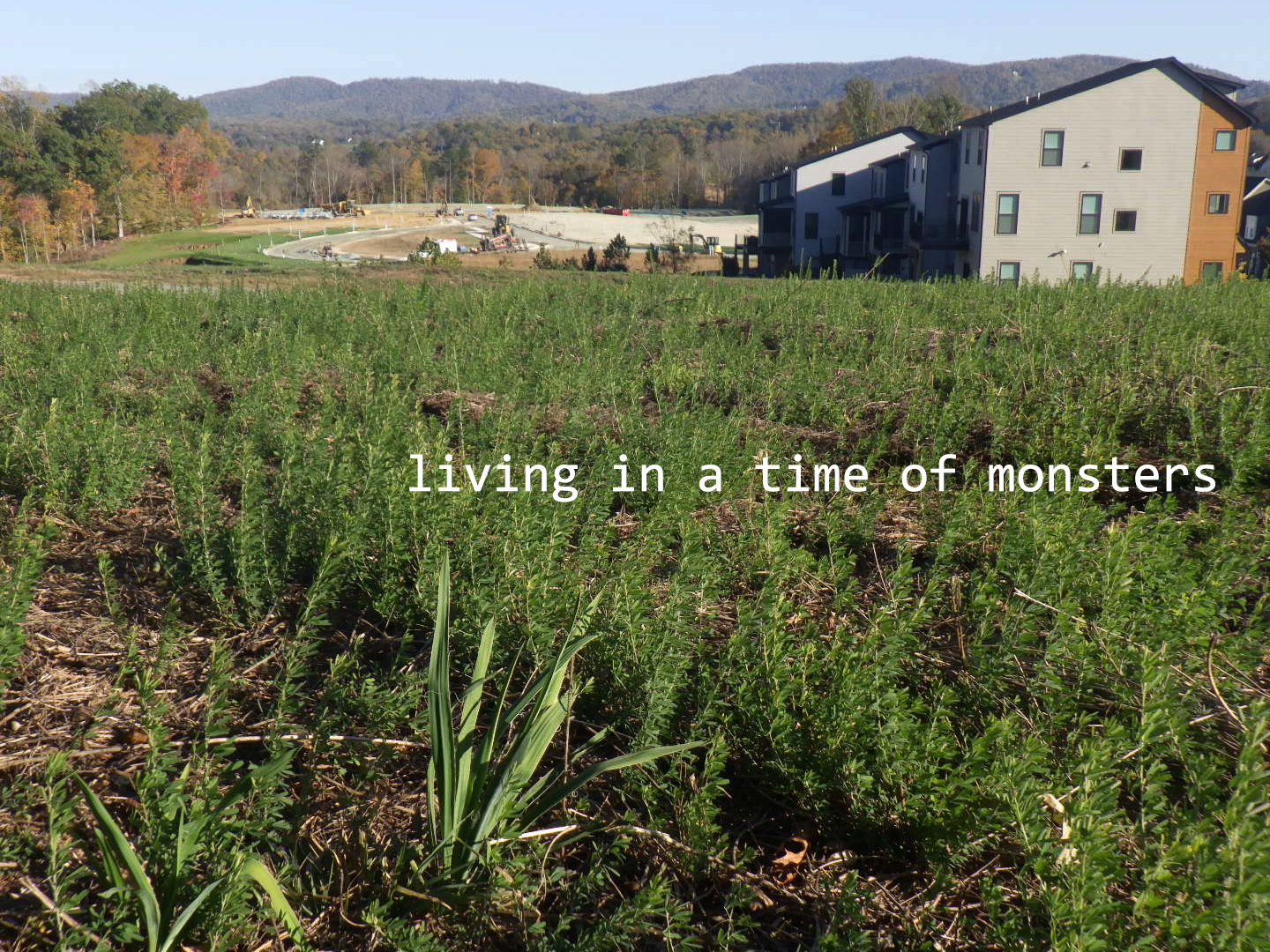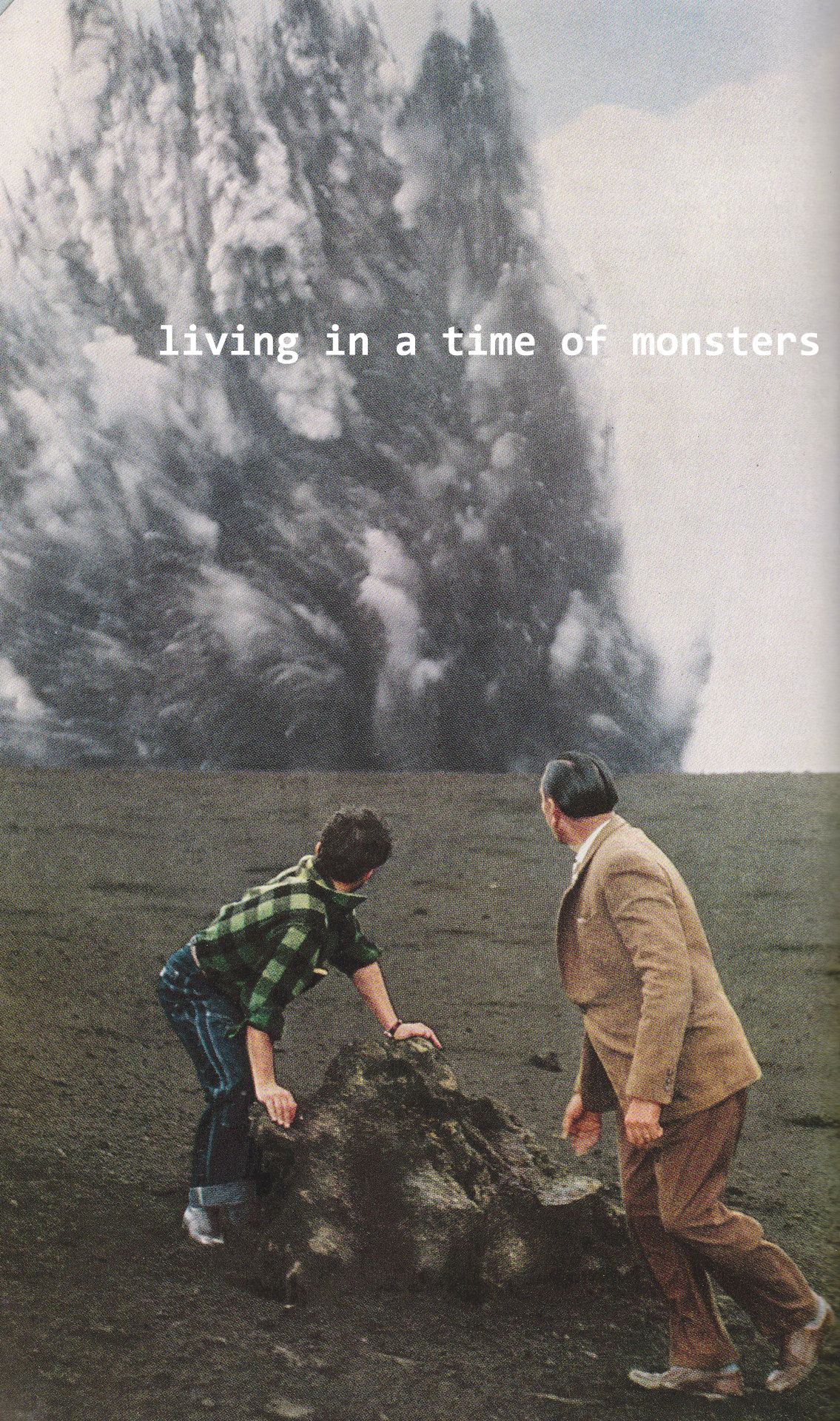
LITTLE BLUESTEM ZINE
LIVING IN A TIME OF MONSTERS
NOW ACCEPTING SUBMISSIONS!
ABOUT THIS ISSUE
Hello friends. We're trying something new to inspire and distribute some interesting art from the community about these interesting times we seem to be inhabiting. The theme is Living in a Time of Monsters, and all that that entails. If you might be interested in reading or contributing, read on!
While imprisoned by Mussolini’s government, Italian politician and humanist philosopher Antonio Gramsci wrote:
La crisi consiste appunto nel fatto che il vecchio muore e il nuovo non può nascere: in questo interregno si verificano i fenomeni morbosi piú svariati.
Half a century later, historian and famous dad Joseph Buttigieg translated the sentence (and its context) fairly literally:
Past and present. The aspect of the modern crisis that is deplored as a "wave of materialism" is related to the so-called "crisis of authority." If the ruling class has lost consensus, that is, if it no longer "leads" but only "rules" — it possesses sheer coercive power — this actually means that the great masses have become detached from traditional ideologies, they no longer believe what they previously used to believe, etc. The crisis consists precisely in the fact that the old is dying and the new cannot be born: in this interregnum, morbid phenomena of the most varied kind come to pass.
Meanwhile, French economist Gustave Massiah read Gramsci’s original and translated his words more loosely:
Le vieux monde se meurt, le nouveau monde tarde à apparaître et dans ce clair-obscur surgissent les monstres.
Elsewhere in the early 21st century, pop philosopher Slavoj Žižek retranslated Massiah’s translation with considerable pizzazz and quoted it more or less everywhere:
The old world is dying, and the new world struggles to be born: now is the time of monsters.
Credit to everyone, it’s an evocative sentence. The original text expresses Gramsci’s qualms about the then-current upsurge in enthusiastic but uncoordinated new Italian socialist organizations at a time when the internal stability of the fascist regime was faltering. Over the years these several iterations by translation have broadened the possible meanings of the text, evoking anxieties beyond the political.
I think most of us have felt something like this at one time or another, a gnawing dread perhaps mixed with a kind of manic optimism- dread for our political future, dread for the poisons in our food, dread for the hardships our children will endure, dread for the extinction of ever-mounting piles of species, dread for the death of the oceans, dread for the kidnapped and disappeared, dread for the imprisoned, dread for the forests on fire, dread for the hospital bills- and hope that this fever will break eventually and the world will be different, somehow. We are not at the point when the fever breaks, only at the point we realize it must, or ought to. We live surrounded by monsters, and many of us have been devoured, are being devoured, and will be devoured before this time has passed.
Monster is an interesting word. Norman aristocrats brought it into English via their French monstre, from the Latin monsterum, meaning 'an omen portending to the will of the gods, hence a supernatural being or object', from monere, 'to warn'*. In an era when Europe’s older polytheisms fought a losing battle against the annihilating pyres of Inquisitional Christianity, it is understandable how diverse spiritual ecologies of divine symbolic messengers could end up reduced by their antagonists to mere hostile brutes and dangerous aberrations. As always, history is written by the victors; so it may happen that the gods of the old world become the monsters of the new. What are the cherished gods of our world, and how might they endure the trials of future histories? Does the etymology alter your former perceptions of the word ‘monster’?
On to our central question: What does it mean to live in a time of monsters? What, or who, are these monsters and what do they portend? What are the bounds of this interregnum, what morbid phenomena heralded its beginning and how will we know when it has passed? Who were we before this moment in history, and how is it changing us as we inhabit it? How are we, transfixed by the present, altering the future? What, if any, are the relationships between monsters of the spiritual, ecological, political, and symbolic variety? How do life forms change and respond to "monstrous" conditions? What patterns in plant growth, animal behavior, fungal presence, bacterial presence, hydrology, etc. demand your attention? Should we trust a hurricane? Are lanternflies comrades? What about bigfoots? What is to be done?
SUBMISSION INSTRUCTIONS
You are invited to compose something on these or related subjects, for submission to this first Little Bluestem produced ‘zine. Essays, poetry, photographs, drawings, comics, very short stories, screeds, polemics, apologia, how-to guides, and more are welcome to be submitted. You can create something new or recycle an old piece that is still relevant (so long as it has not been published anywhere else- personal blogs, websites, homebrew zines, etc. are OK, just no prior paid or otherwise formal publications). We can’t guarantee we’ll use everything we receive, but we’ll look at everything and put it in there if we can.
All accepted submissions will receive a free copy of the 'zine and a Little Bluestem t-shirt!
We are particularly interested in pieces that somehow center the lives of non-human people; you can read some of our articles to learn more about our ethos, particularly as relates to non-human personhood.
Written submissions should be no longer than 3,500 words in English or Spanish, in a 12 pt font. Poems should be no longer than 40 lines, including line breaks, and fit on one page. Prose texts will be proofread for grammar and clarity per the Chicago Manual of Style. Please send as an editable .docx file.
Visual art should be presented as a color or black and white image formatted as a .png file of no more than 10 MB.Please also include a brief (less than 30 words) artist’s bio.
Email all submissions to nursery@littlebluestem.net with 'Zine Submission' in the subject line.Submissions are due by 5 PM EST on October 1st. We aim to have the ‘zine printed and ready for distribution by the Winter Solstice, December 21st.
Original illustration by unknown pulp artist. More information here.
Eric Partridge, Origins: A Short Etymological Dictionary of Modern English, 1983




